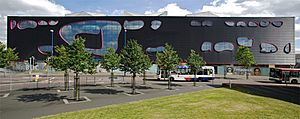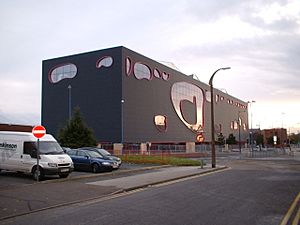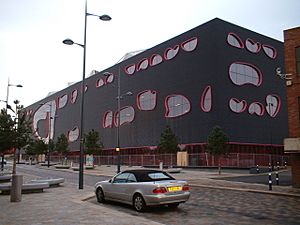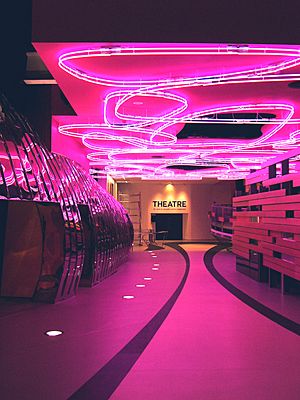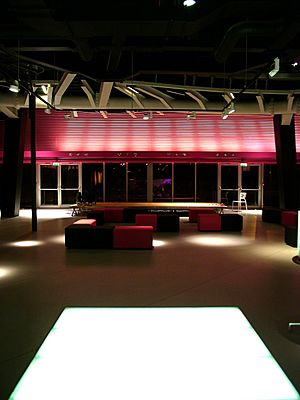The Public, West Bromwich facts for kids
The Public was a special building in West Bromwich, England. It was an art gallery and a place for many different activities. It was part of a big plan to make West Bromwich a better place. The building closed in November 2013. It later reopened in October 2014 as part of Sandwell College.
In May 2013, it was announced that Sandwell Metropolitan Borough Council was talking with Sandwell College. They discussed letting the college use The Public as a sixth-form college. A sixth-form college is where students go after high school. At that time, Sandwell College's own sixth-form was very popular. There were six students wanting each spot.
The Public was a place for people to create and enjoy art. It was also home to 27 small companies. These companies, along with the Sandwell Arts Trust, employed about 120 people. Another 120 people were learning digital media skills there. In 2012–2013, over 380,000 people visited The Public. This was a big increase from the year before. A newspaper called The Guardian even called it "a playground for adults." This showed how fun and interactive it was.
In September 2012, a local newspaper said The Public was finally becoming a success. It was winning over local people. But just over a year later, on November 23, 2013, The Public closed for good. The building officially reopened as a sixth form college on October 1, 2014. Prince Edward, the Earl of Wessex, opened it.
Contents
What Was The Public?
The idea for The Public came from a group called Jubilee Arts. This group started in 1974. Their goal was to make life better for local people through art. They wanted to build a permanent art space. It would be a challenging and interesting building. It would also be a place for community groups to meet.
British architect Will Alsop designed the building. Construction began in May 2003. The project faced many problems and went over budget. Some groups supporting it even closed down. The Public finally opened to visitors in 2008. The ground floor was the first part to open. The rest of the building, including digital artworks, was finished by 2010.
Sandwell Arts Trust managed the building. It had exhibition spaces for art. There were also interactive art displays. The building included a cafe bar and a theatre. It also had rooms for conferences and offices. By June 2013, over 1,000,000 visitors had come through its doors.
Art and Events at The Public
The Public became a well-known landmark in the area. It attracted visitors from nearby and far away. It still needed some public funding. But it also made money from renting out spaces and holding events. The building aimed to earn more money as the surrounding construction finished.
The art program showed works by famous artists. It also displayed art by local artists. This helped more people get interested in art. In summer 2013, a major show called Ordinary/Extra/Ordinary was held. It featured art by Tracey Emin, David Shrigley, and Jeremy Deller. A new artwork by Birmingham artist Lucy McLauchlan was also shown. Later that summer, local artists displayed their talents in the Annual Summer Open.
Other past exhibitions included The Art of Motion. This show featured work by Maurice Broomfield. There was also a project celebrating the books of local authors Janet and Allan Ahlberg. Famous photographer Martin Parr also contributed his work.
The Public hosted many different events. There were comedy shows with well-known comedians like Al Murray and Jenny Eclair. Music events featured new and upcoming bands. People could also join in activities like tea dancing and knitting. These activities were often led by local community members.
The Building's History
The construction of The Public had many difficulties. The project was very controversial. It ran into money problems before it was even supposed to open in July 2006. This was because Sandwell Metropolitan Borough Council held back £2 million. There was also an argument about charging an entry fee of £6.95. These plans were stopped. The Arts Council then gave another £3 million grant. This allowed The Public to offer free entry to the gallery. It opened in 2008–2009.
In November 2004, the original architects left the project. Julian Flannery took over the design of the building's inside. He also oversaw the construction. In 2006, new plans were made for the building. Some areas, like the Theatre and the Pink Tank Cafe, were completely redesigned.
After all the issues, Sandwell Metropolitan Borough Council took over the building in 2009. They created Sandwell Arts Trust to run The Public.
Awards and Recognition
The Public was praised for its "exciting and vibrant lighting scheme." Kevan Shaw Lighting Design won an award for Public Buildings in March 2009. They said the lighting was a key part of the building's experience. The lighting used colors and movement to create amazing effects inside. The Public is also listed in the "1001 Buildings to See Before You Die List."


